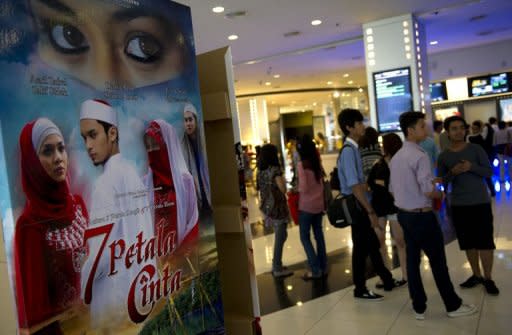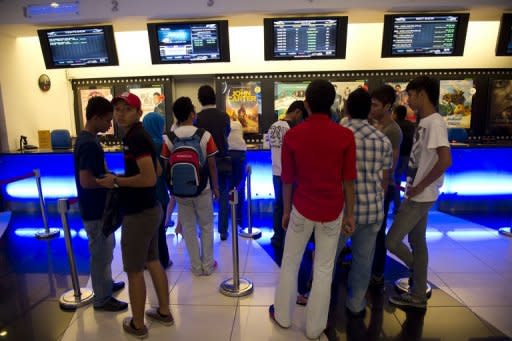Horror films rise from the dead in Malaysia
Haunted highways, an oil-smeared ghost prowling villages for virgins and vampiress spirits thirsting for blood: Malaysia has an obsession with the supernatural rooted in age-old legends. Now that obsession is increasingly being projected on the nation's cinema screens, with horror movies emerging as a force to be reckoned with in a booming domestic film industry. But this wasn't always the case. Horror films were effectively banned for three decades in the Muslim-majority country for celebrating the other-worldly in violation of Islamic teachings. But since the retirement of strongman premier Mahathir Mohamad in 2003 there has been a modest relaxation in the acceptable limits of popular culture -- and horror movies appear to have risen from the dead. Three of Malaysia's six top-grossing films are fright flicks made in the past two years, and the genre made up more than a third of domestic movies in 2011. This growth, along with popular action films and comedies, has helped fuel a burgeoning industry. The number of local films in cinemas grew from just eight in 2000 to 49 in 2011 and ticket sales have quintupled in the past six years. Last year, local movies collected more than 100 million ringgit ($32 million) in box office sales. Horror films have struck a chord because they reflect the country's village culture and the traditional superstitions that trouble Malay hearts, says director Ahmad Idham Ahmad Nazri. "Horror movies are the type that will be close to our culture," said the director of 2011 box-office hit "Ghost Pillion Rider," about a motorcycle speedster haunted by the spirit of a girl who died aboard his bike. Malaysia's highest grossing horror movie ever -- and its third-biggest overall -- Ghost Pillion Rider collected 8.53 million ringgit, around 3 million ringgit less than the record-setting action film "KL Gangster" from the same year. "In any country, for you to understand the culture, where they come from, you watch horror movies," Ahmad Idham added. While differing religious views differentiate Asian horror from that in the West, the region has contributed its own take on familiar tropes, from Japan's psychological frights to Hong Kong's horror-comedies. After a 30-year lull in Malaysia -- censors stopped approving scary movies as Islamic sentiments rose in the 1970s -- "Fragrant Night Vampire" hit screens in 2004. The film is about a "pontianak" or vampiress spirit -- a recurring Malay legend and movie subject. It was a huge hit at home and even won accolades abroad. "Malaysian filmmakers suddenly realised there is a lot of money to be made in horror films... so they jumped on the bandwagon," said Andrew Hock Soon Ng, a film expert with the Malaysia campus of Australia's Monash University. "However modern we are, we are still very much regulated by our traditional belief systems," Ng said. Malays were animist before Islam's 15th-century arrival, but belief in the existence of spirits separable from physical forms and black magic still persist. A recurring Malaysian character is the "orang minyak," or "oily man," an elusive bogeyman smeared in black oil who hunts for virgins to rape. It was immortalised in 1958's "Curse of the Oily Man" by the late P. Ramlee, Malaysia's most celebrated filmmaker, and claims of real-life "sightings" remain common. In January, local media reported residents of a suburb of the capital Kuala Lumpur patrolling streets after two "orang minyak" were spotted. Meanwhile, reports of school classes being disrupted by suspected cases of "possessed" students are regular. In one publicised incident in 2008, when 35 students were gripped by hysteria in a school in eastern Pahang state, school authorities reportedly held special religious recitals and prayers and engaged a spiritual healer to "cleanse" the school. Ahmad Idham said two of his own crew became hysterical while filming one of his several fright films, and when a stuntman died in an accident on one of his sets some members of the crew blamed supernatural forces. He now takes "precautions" when shooting, such as praying to Allah and seeking guidance from his uncle, an Islamic spiritual healer. Mahathir, still an influential conservative voice, last year called such films a bad influence that generated panic. The National Fatwa Council, which issues Islamic edicts, called them "counter-productive to building a developed society." There has been no fatwa or any hint of a new ban, but like all Malaysian movies, horror films are policed by the Film Censorship Board. It orders objectionable scenes cut and positive messages inserted, such as Islam winning out in the end over the supernatural. In "Ghost Pillion Rider," for example, the reckless motorcycle-racing protagonist repents, becoming more religious and responsible. Such pressure stunts a promising homegrown genre that faces competition from imported Hollywood and other foreign blockbusters, and challenges directors who need to "think beyond" the conventional to expand their art, said Ahmad Idham. "It's quite difficult... to explore new things. As a filmmaker you have to think beyond. But when you start to think beyond, people cannot catch up," he said.



